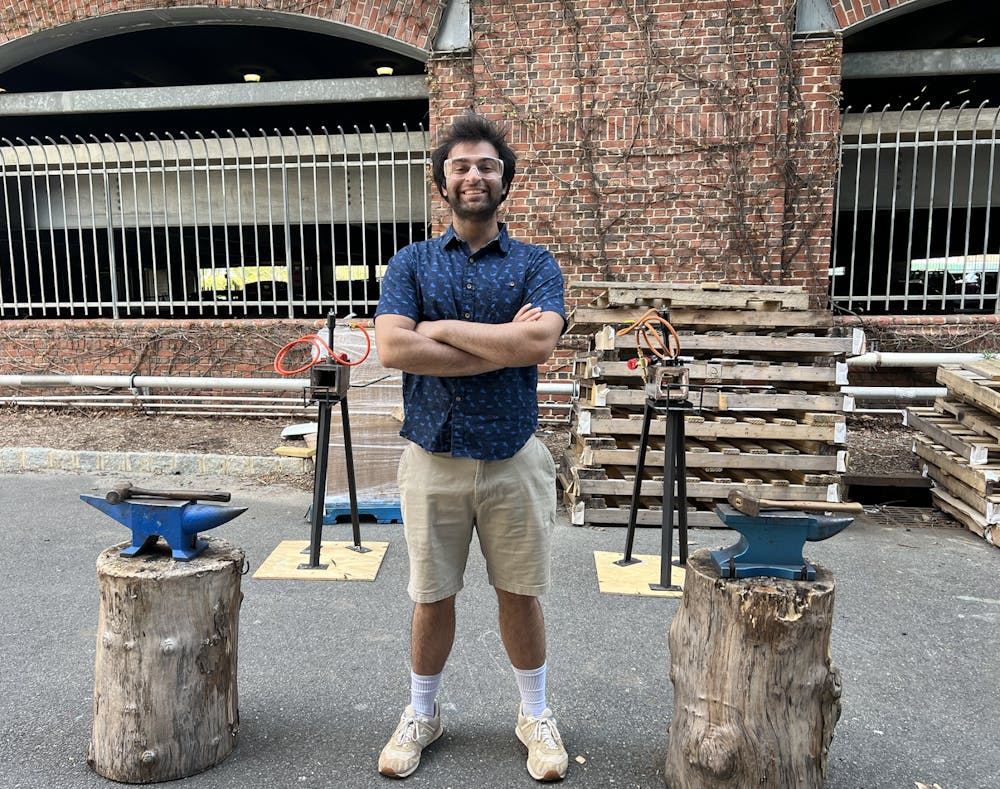Hidden behind a construction fence near Bowen Hall, nestled between a parking garage and storage unit, is a quiet alleyway, home to the members of the Princeton Blacksmith Club. With the help of this alleyway, a storage garage, forges, and a shared passion, the club has been able to bring their appreciation for blacksmithing to life.
According to their website, the Princeton Blacksmithing Club has a mission of maintaining a welcoming, open environment so that people can practice the art of blacksmithing. While the club was inactive for many years, it was revived with the help of Soloman Khan ’26.
In an interview with The Daily Princetonian, Khan shared that to his understanding, the club was founded about five or six years ago. Originally intended for graduate students, the club was openned to undergraduates a few years before Khan matriculated at Princeton.
Khan’s passion for blacksmithing began during his senior year of high school, where he enrolled in a metal technology class that was well-equipped with forges, crucibles, and other blacksmithing tools.
At Princeton, Khan became a co-president of the Princeton Blacksmithing Club. Along with co-presidents Sterling Hall ’25 and Joseph Roberts ’27, Khan has spearheaded the effort to re-forge the club’s path forward. Blacksmithing is one of Khan’s favorite hobbies, and he helped revive the club as a “great way to both develop ... skills and share the unique art of blacksmithing with the campus community.”
The club hosts an open forge night every month, which has been approved to be held in the alleyway outside of Bowen Hall in the E-Quad. At these events, a professional blacksmith from Trenton guides attendees through forging techniques, usually for about 10 to 15 people.
The ‘Prince’ ventured out to the E-Quad to see the club’s meeting alley. To get there, you walk along a dirt path until you stumble upon a garage space. When we went, Khan and I were greeted by a black cat in the Bowen Hall alleyway. I observed massive propane tanks as we walked into the garage space where the club stores their materials on an organized storage shelf among other shelves of janitorial supplies.
Khan showed me the tools used at open forge nights: hammers, tongs, marshmallow sticks, and bottle openers, as well as the forges themselves, which get connected to the propane tanks I had seen outside. The space also has tree trunks, repurposed to hold up anvils. Once the materials were set up, space enlivened and took shape — it was easy to imagine Princeton blacksmiths heating and shaping metal in the space.
Any member of the Princeton community, whether they be students or faculty members, are welcome to attend these open forge nights — just make sure to wear goggles, long pants, and close-toed shoes.
“Many engineering clubs are only open to people who have the technical skills to make stuff happen,” Khan remarked. “But blacksmithing is very educational, and we just want to make sure that everyone has the chance to appreciate the hobby of metal work for what it is.”
Blacksmithing may seem a daunting hobby, but the Princeton Blacksmithing Club has made it accessible. Three words to describe the blacksmithing club? “Metal,” of course, Khan said, because of the materials used. But also “inclusive” and “growing” — the club’s goal to become more expansive and active throughout the school year.
While a random alleyway with stray black cats may seem sketchy to some, the space and the artistry within it will likely appeal to any interested burgeoning blacksmith.

Monica Zepeda is a contributing writer for The Prospect and a member of the Class of 2028. She can be reached at mz9063[at]princeton.edu








